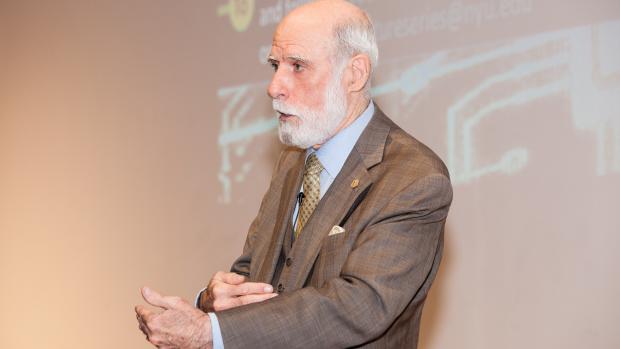Internet Pioneer Vint Cerf Talks Cybersecurity on Web 3.0

Vinton G. Cerf has been called many things over the course of his long career: father of the Internet, pioneer, living legend. . . but November 4, 2015 just might have marked the first time he was called a rock star and likened to the Beatles and Elvis.
Nasir Memon, chair of the Department of Computer Science and Engineering at the NYU Tandon School of Engineering made that apt analogy while introducing Cerf, who was in Brooklyn to deliver the seventh Sloan Distinguished Lecture, the latest in a series of talks focused on cybersecurity and privacy, generously sponsored by the Sloan Foundation and held at Tandon.
Cerf—who wrote the communication protocol for the Advanced Research Projects Agency Network (ARPANET), the first computer network based on packet switching—spoke on the coming age of the Internet of Things to a rapt audience numbering in the hundreds.
The much-buzzed-about Internet of Things refers to the plethora of physical objects embedded with software, sensors, and network connectivity, allowing them to collect and exchange data. Cerf pointed out the growing list—which now includes driverless cars, televisions, light bulbs, glucose monitors, and even surfboards. He described his own wine cellar, which he’s outfitted with radio-frequency identification (RFID) tags, so that he can tell if any bottle is removed without his permission. (He admits that he overlooked one bug when developing the system: a thirsty and determined thief could simply open a bottle and drink it right in the cellar.)
Despite his obvious delight at the possibilities for improving healthcare (with personal medical monitors), education (with networked lab equipment) and other aspects of life, Cerf was plainspoken about the issues that will unquestionably arise as the Internet of Things comes of age: the problem of configuring so many devices, establishing standards, avoiding software errors, ensuring safety, and controlling access. (You probably want your local fire department to have access to data about the inhabited rooms in your house, he points out, for example, but prefer to keep that information out of the hands of burglars.)
After his lecture and a brief break (during which he was as swamped with fans as Elvis would have been in that situation), Cerf took part in a panel discussion moderated by Paul M. Horn, NYU distinguished scientist in residence, NYU senior vice provost for research, and NYU Tandon senior vice dean for strategic initiatives and entrepreneurship. They were joined on the stage by Deborah Estrin, a computer scientist at Cornell NYC Tech and co-founder of Open mHealth, and Beth Simone Noveck, director of The Governance Lab at NYU Tandon, who good-naturedly compared themselves to back-up singers. The panel touched upon such important topics as how the Internet of Things will impact society on a macro level, who will control the data collected by devices deployed in smart cities, and what policies and regulations can be put in place to mitigate the troubling security and privacy issues that are already coming to the fore.
Forget seeing Jay Z opening at the Barclays Center up the street. Cerf, now Google’s vice president and chief Internet evangelist, delivered a high-wattage performance that may long be remembered as the hottest ticket ever presented in Brooklyn.




